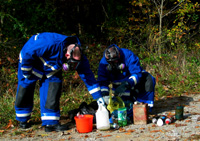Walk Your Land Program Educates Landowners On Methamphetamine Production
Walk Your Land Program Educates Landowners On Methamphetamine Production

Illegal production and use of methamphetamine is reaching epidemic levels in Kentucky . To combat use and help property owners understand the dangers associated with these labs, the Universityof Kentucky Cooperative Extension Service , Pennyrile Narcotics Task Force and East Kentucky’s Operation UNITE are joining forces in a program called Walk Your Land.
Meth labs can be found almost anywhere from homes to rural farm land. The production, or “cooking” process, and waste left behind can be dangerous to people, animals and the environment. For every pound of meth produced, about six pounds of hazardous waste is left behind, said Cheyenne Albro, director of the Pennyrile Narcotics Task Force.
The Walk Your Land program is an effort to educate all property owners about meth production and then get them to check their properties. Most people would not expect to find the remnants of a lab on their property, and most would not realize what it was even if they came across one.
“The components are things that we use in everyday life--gallon fruit jars, aquarium tubing, plastic spoons, plastic bowls, glassware," Albro said. “Because of that they are often overlooked as being a lab and when someone sees them in the woods or locates them, they don’t realize the dangers associated with them. They think it’s just a bag of trash.”
Tackling drug abuse and awareness, especially methamphetamines, is an area where Extension in western Kentucky wanted to focus its efforts with the assistance of the Extension Health Education through Extension Leadership program.
“We really hope to get farmers and landowners, outdoors people, anyone who has a chance at seeing these clandestine meth production areas to really know what they are, know how to deal with them and know whom to call,” said Torey Earle, McCracken County 4-H Youth Development Extension agent and chair of the drug awareness quick response team.
Besides encouraging owners to regularly examine their property, the program provides a photo identification guide of items that might indicate methamphetamine production.
“One of the biggest things we try to get across in the Walk Your Land program is if you see anything unusual, first learn to recognize what it is,” Earle said. “If it's trash, leftover meth production, don’t touch it, don’t smell it, don’t shake it, don’t try to do anything, just call someone immediately.”
The photo identification guides will be available at county Extension offices and the guides include information on who to call should a person find anything.
“By organized vigilance, they have fewer options for them to cook and that’s what we want to happen,” said Doug Burnham, HEEL program specialist.
To help get the program rolling, the Pennyrile Narcotics Task Force has agreed to take the program one step further by co-sponsoring a pilot program with Cooperative Extension beginning Nov. 8 through Dec. 31.
Operation Safe Land will provide removal of meth-related waste from rural properties belonging to farmers who have been victims of unauthorized use of their land for meth production. It is hoped that the program will serve as a model for other areas.
Farm or land owners who believe they may have an abandoned meth lab on their property and would like to participate in Operation Safe Land can call the Pennyrile Narcotics Task Force at 270-885-0031.
To learn more about the Walk Your Land Program contact a local county Extension office.
-30-